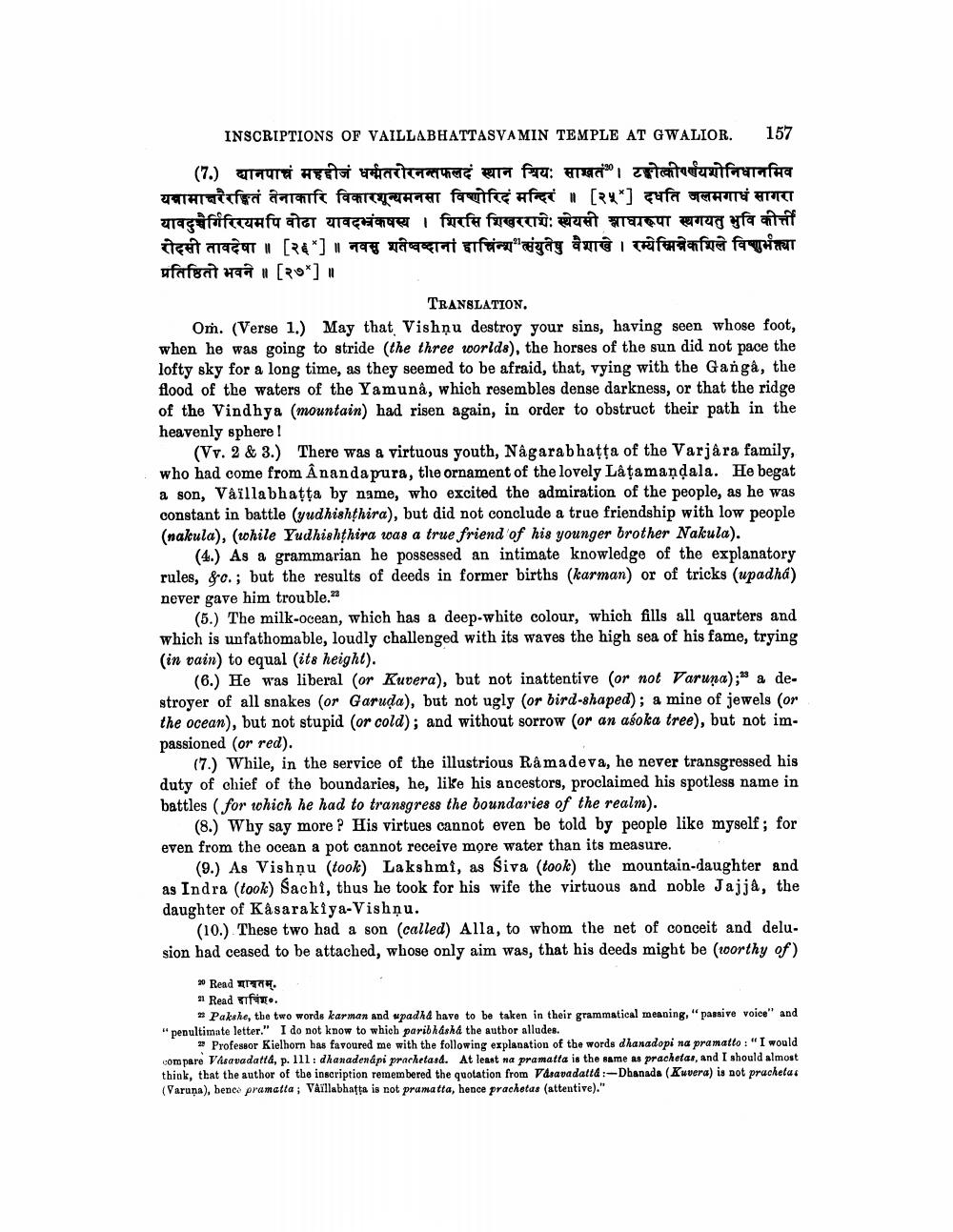________________
INSCRIPTIONS OF VAILLABHATTASVAMIN TEMPLE AT GWALIOR.
होकीयोनिधानमिष
(7.) यानपाचं मही तरोरनन्तफलदं खान श्रियः साख यनामाक्षरैरङ्गितं तेनाकारि विकारशून्यमनसा विष्णोरिदं मन्दिरं ॥ [ २५ ] दधति जलमगाधं सागरा यावदुचैर्गिरियमपि वोढा यावदभ्रंकषस्य । शिरसि शिखरराथेः स्थेयसी नावारूपा स्थगयतु भुवि कीर्त्ती रोदसी तावदेषा ॥ [२६] ॥ नवसु शतेष्वव्दानां द्वात्रिंश" त्संयुतेषु वैशाखे । रम्येस्मिन्वेकशिले विष्णुभक्त्या प्रतिष्ठित भवने । [२७] ॥
157
TRANSLATION.
Om. (Verse 1) May that Vishnu destroy your sins, having seen whose foot, when he was going to stride (the three worlds), the horses of the sun did not pace the lofty sky for a long time, as they seemed to be afraid, that, vying with the Gangå, the flood of the waters of the Yamunâ, which resembles dense darkness, or that the ridge of the Vindhya (mountain) had risen again, in order to obstruct their path in the heavenly sphere!
(Vv. 2 & 3.) There was a virtuous youth, Nagarabhatta of the Varjára family, who had come from Anandapura, the ornament of the lovely Lâṭamandala. He begat a son, Vâïllabhaṭṭa by name, who excited the admiration of the people, as he was constant in battle (yudhishthira), but did not conclude a true friendship with low people (nakula), (while Yudhishthira was a true friend of his younger brother Nakula).
(4.) As a grammarian he possessed an intimate knowledge of the explanatory rules, &c.; but the results of deeds in former births (karman) or of tricks (upadha) never gave him trouble.""
(5.) The milk-ocean, which has a deep-white colour, which fills all quarters and which is unfathomable, loudly challenged with its waves the high sea of his fame, trying (in rain) to equal (its height).
(6.) He was liberal (or Kuvera), but not inattentive (or not Varuna); a destroyer of all snakes (or Garuda), but not ugly (or bird-shaped); a mine of jewels (or the ocean), but not stupid (or cold); and without sorrow (or an asoka tree), but not impassioned (or red).
(7.) While, in the service of the illustrious Râmadeva, he never transgressed his duty of chief of the boundaries, he, like his ancestors, proclaimed his spotless name in battles (for which he had to transgress the boundaries of the realm).
(8.) Why say more? His virtues cannot even be told by people like myself; for even from the ocean a pot cannot receive more water than its measure.
(9.) As Vishnu (look) Lakshmi, as Siva (took) the mountain-daughter and as Indra (took) Sachi, thus he took for his wife the virtuous and noble Jajja, the daughter of Kasarakiya-Vishnu.
(10.) These two had a son (called) Alla, to whom the net of conceit and delusion had ceased to be attached, whose only aim was, that his deeds might be (worthy of)
20 Read
Read डाचिंश..
Pakshe, the two words karman and upadhd have to be taken in their grammatical meaning, "passive voice" and "penultimate letter." I do not know to which paribháshá the author alludes.
2 Professor Kielhorn has favoured me with the following explanation of the words dhanadopi na pramatto: "I would compare Vasavadattá, p. 111: dhanadenâpi prachetasd. At least na pramatta is the same as prachetas, and I should almost think, that the author of the inscription remembered the quotation from Vasavadatta:-Dhanada (Kuvera) is not prachetas (Varuna), bence pramatta; Vaïllabhatta is not pramatta, hence prachetas (attentive)."




